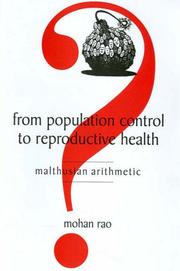| Listing 1 - 6 of 6 |
Sort by
|

ISBN: 1282424734 9786612424731 8132103335 9788132103332 0761932690 0761932852 Year: 2004 Publisher: New Delhi Thousand Oaks, Calif. Sage Publications
Abstract | Keywords | Export | Availability | Bookmark
 Loading...
Loading...Choose an application
- Reference Manager
- EndNote
- RefWorks (Direct export to RefWorks)
The Indian family planning programme, one of the largest public health initiatives in the world, has adopted various strategies since its inception-none, however, have yielded the desired results. What are the reasons for this? Why do large sections of the elite blame the population `explosion` for all the social and economic problems that India faces? Answering these questions, the book critically evaluates the family planning programme in India, exposing its biases and skewed priorities. It argues that Neo-Malthusian ideology has profoundly influenced not only demographers, but also policy p
Birth control --- Women --- Neo-Malthusianism --- Malthusianism --- Population control --- Pregnancy --- Family planning --- Contraception --- Reproductive rights --- Government policy --- Health and hygiene --- Prevention --- India --- Bharat --- Bhārata --- Government of India --- Ḣindiston Respublikasi --- Inde --- Indië --- Indien --- Indii︠a︡ --- Indland --- Indo --- Republic of India --- Sāthāranarat ʻIndīa --- Yin-tu --- インド --- هند --- Индия --- Population policy.

ISBN: 0761993479 8170368138 Year: 1999 Publisher: New Delhi Thousand Oaks, CA London Sage Publications
Abstract | Keywords | Export | Availability | Bookmark
 Loading...
Loading...Choose an application
- Reference Manager
- EndNote
- RefWorks (Direct export to RefWorks)
Book
ISBN: 9386042568 8132112288 1282839608 9786612839603 8132106148 9788132106142 9781282839601 9788132102977 8132102975 Year: 2010 Publisher: New Delhi, India Thousand Oaks, Calif. SAGE
Abstract | Keywords | Export | Availability | Bookmark
 Loading...
Loading...Choose an application
- Reference Manager
- EndNote
- RefWorks (Direct export to RefWorks)
Markets and Malthus: Population, Gender, and Health in Neo-liberal Times explores the ideas and institutions that were framed at the 1994 United Nations population conference in Cairo and traces their trajectories sixteen years down the line. Why were Third World feminists profoundly critical of the Cairo consensus and process? How has the health of people around the world been affected by neo-liberal economic policies? What have these meant for women's rights, including reproductive rights?. The book presents detailed case studies from various countries ranging from India and China, to Egypt,
Population --- Women --- Population policy. --- Neoliberalism. --- Neo-liberalism --- Liberalism --- Population planning --- Social policy --- Economic aspects. --- Economic conditions. --- Malthus, T. R. --- Malthus, Thomas Robert, --- Malʹtus, Tomas Robert, --- Ma-êrh-sa-ssŭ, --- Malthus, Robert, --- Author of the Essay on the principle of population, --- Marasasu, --- Essay on the principle of population, Author of the, --- מלתוס, תומס רוברט,
Book
Abstract | Keywords | Export | Availability | Bookmark
 Loading...
Loading...Choose an application
- Reference Manager
- EndNote
- RefWorks (Direct export to RefWorks)
Ethics of family. Ethics of sexuality --- Sociology of the family. Sociology of sexuality --- Demography --- Economic schools --- Development aid. Development cooperation --- Family law. Inheritance law --- Hygiene. Public health. Protection --- Infectious diseases. Communicable diseases --- Gynaecology. Obstetrics --- Feminism --- Aids --- Health --- Reproductive health --- Development policy --- Reproductive rights --- Population policy --- Book --- Non-governmental organizations --- Abortion --- Conferences --- Economic theory --- United Nations --- China --- India --- Egypt --- Africa --- United States of America --- Latin America
Book
ISBN: 0199086990 Year: 2016 Publisher: New Delhi : Oxford University Press,
Abstract | Keywords | Export | Availability | Bookmark
 Loading...
Loading...Choose an application
- Reference Manager
- EndNote
- RefWorks (Direct export to RefWorks)
Poverty and poverty eradication was the predominant paradigm within which India's 20th century science policy was constructed. Yet, when we think of science in India today, this earlier priority of poverty eradication is now hard to find. What accounts for this? This volume asks: has the problem of poverty in India been solved? Or, has it become inconvenient alongside the rise of new narratives that frame India as a site of remarkable economic growth? Indeed, has there been a loss of faith in the ability of science to tackle poverty? Together, the essays collected explore the broader implications for the new role of science in India: as a driver of economic growth for India, rather than as a solution to the persistence of poverty.
Digital

ISBN: 9789048550135 Year: 2021 Publisher: Amsterdam Amsterdam University Press
Abstract | Keywords | Export | Availability | Bookmark
 Loading...
Loading...Choose an application
- Reference Manager
- EndNote
- RefWorks (Direct export to RefWorks)
| Listing 1 - 6 of 6 |
Sort by
|

 Search
Search Feedback
Feedback About UniCat
About UniCat  Help
Help News
News